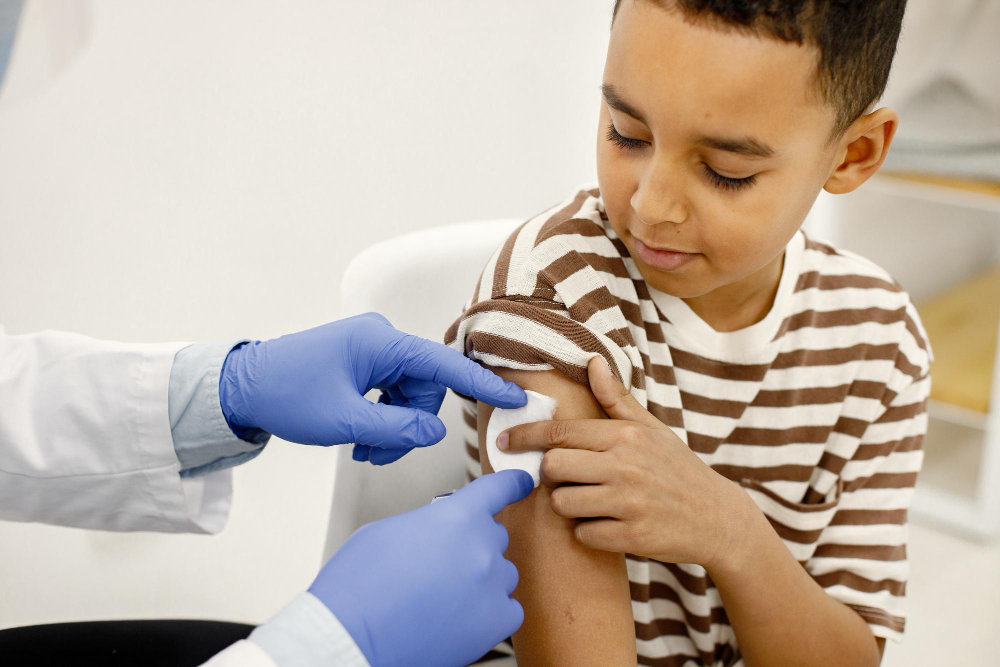Introduction
Vaccinations in children protect against many serious diseases. These vaccines help your child’s body fight infections. As a result, your child stays healthy and strong. Vaccines are safe and important for every child. The World Health Organization (WHO) and Centers for Disease Control and Prevention (CDC) recommend them for all children. Early protection is key, so following the childhood vaccination schedule is vital. In this blog, you will learn why vaccines matter, which ones are common, and how they keep your child safe.
Common Vaccines for Children
Children receive several vaccines during their early years. Each vaccine protects against a specific disease. For example, some prevent measles, while others stop polio. Here are some common vaccines for kids:Measles, Mumps, and Rubella (MMR)Diphtheria, Tetanus, and Pertussis (DTaP)Polio (IPV)Hepatitis BHaemophilus influenzae type b (Hib)Pneumococcal (PCV13)RotavirusVaricella (chickenpox)Influenza (flu)
Many of these vaccines are given as a series of shots. This means your child will need more than one dose for full protection.
Recommended Vaccination Schedule
Following the childhood vaccination schedule helps protect your child at the right time. The CDC and WHO provide clear guidelines. Most vaccines start at birth or within the first few months. Here is a simple outline:At birth: Hepatitis B2, 4, and 6 months: DTaP, IPV, Hib, PCV13, Rotavirus12-15 months: MMR, Varicella, Hepatitis AYearly: Influenza
However, your doctor may adjust the schedule for your child’s needs. Always check with your pediatrician for the latest updates.
How Vaccines Work
Vaccines teach the body to fight germs. They use tiny, safe parts of the germ or a weak form. Because of this, your child’s immune system learns to recognize and attack the real disease if it appears later. This process is called immunization. It helps your child build strong defenses without getting sick first. As a result, vaccines prevent many dangerous illnesses.
Safety and Side Effects
Vaccine safety for kids is a top priority. Before approval, vaccines go through many tests. Health experts watch for side effects even after vaccines are in use. Most children have only mild reactions, such as:Soreness at the shot siteLow feverFeeling tired
Serious side effects are very rare. If you notice anything unusual, contact your doctor right away. Overall, the benefits of immunization in children far outweigh the risks.
Myths vs. Facts About Childhood Vaccines
Many myths about vaccines can cause worry. Let’s look at some common myths and the real facts:Myth: Vaccines cause autism.Fact: Studies show no link between vaccines and autism.Myth: Too many vaccines overwhelm the immune system.Fact: Children’s bodies handle many germs daily. Vaccines are safe and do not overload the immune system.Myth: Natural infection is better than vaccination.Fact: Vaccines protect without the risk of severe illness or complications.
Always trust information from reliable sources like the CDC and WHO.
Tips for Parents
Preparing for vaccinations can help your child feel calm. Here are some tips:Bring your child’s vaccine record to every visit.Talk to your child about what to expect.Hold your child or bring a favorite toy for comfort.After the shot, watch for mild side effects like soreness or fever.Give extra fluids and let your child rest if needed.
If you have questions, ask your doctor before or after the visit. This way, you can feel confident about your child’s care.
Prevention and Community Benefits
Vaccines do more than protect your child. They also help keep your community safe. When most people are vaccinated, diseases cannot spread easily. This is called herd immunity. It protects babies, older adults, and those who cannot get vaccines. Because of this, getting your child vaccinated helps everyone stay healthy.
In summary, vaccinations in children are safe, effective, and vital for good health. They protect your child and your community from serious diseases. Consult your pediatrician for personalized vaccination advice for your child.

